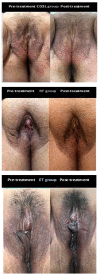Fractional CO2 Laser, Radiofrequency and Topical Estrogen for Treating Genitourinary Syndrome of Menopause: A Pilot Study Evaluating the Vulvar Vestibule
- PMID: 38256341
- PMCID: PMC10818998
- DOI: 10.3390/medicina60010080
Fractional CO2 Laser, Radiofrequency and Topical Estrogen for Treating Genitourinary Syndrome of Menopause: A Pilot Study Evaluating the Vulvar Vestibule
Abstract
Background and Objectives: Genitourinary syndrome of menopause (GSM) affects more than half of postmenopausal women. This study aimed to evaluate the clinical and histological aspects of microablative fractionated CO2 laser (CO2L), microablative fractionated radiofrequency (RF) and intravaginal estrogen (ET) therapy as GSM treatments for the vulvar vestibule. Materials and Methods: This study included postmenopausal women with at least one moderate-to-severe complaint of GSM. Women in the CO2L and RF groups received three monthly sessions of outpatient vulvovaginal therapy. The procedures were performed 30 min after applying 4% lidocaine gel to the vulva and vaginal introitus. Vulvar vestibular pain was assessed after each application using a 10-point VAS. A follow-up evaluation was performed 120 days after beginning each treatment. Digital images of the vulva were obtained and a 5-point Likert scale (1 = much worse, 2 = worse, 3 = neutral, 4 = better, 5 = much better) was used to assess the global post-treatment women's impression of improvement regarding GSM. Results: A significant change in clinical aspects of the vulva was observed after all treatments with a reduction in the atrophic global vulvar aspect and an enhancement of the trophic aspect. High satisfaction was also reported after treatment according to the Likert scale evaluation: CO2L (4.55 ± 0.97), RF (4.54 ± 0.95), CT (4 ± 1.41), p = 0.066. Histological evaluation revealed enhanced dermal papillae before pre-treatment, significantly reducing post-treatment in all groups (p = 0.002). No unintended effects were reported. Conclusions: CO2L, RF, and ET significantly improved GSM concerning the vulvar vestibule at the 4 months follow-up.
Keywords: genitourinary syndrome of menopause (GSM); microablative fractionated CO2 laser (CO2L); microablative fractionated radiofrequency (RF); vulvar vestibular.
Conflict of interest statement
I.F. is employed at El.En. Group. The other authors declare that the research was conducted in the absence of any commercial or financial relationships that could be construed as potential conflicts of interest.
Figures
Similar articles
-
Women with Genitourinary Syndrome of Menopause Treated with Vaginal Estriol, Microablative Fractional CO2 Laser and Microablative Fractional Radiofrequency: A Randomized Pilot Study.Photobiomodul Photomed Laser Surg. 2023 Dec;41(12):718-724. doi: 10.1089/photob.2023.0113. Photobiomodul Photomed Laser Surg. 2023. PMID: 38085184 Clinical Trial.
-
Fractional and Microablative CO2 LASER and Radiofrequency in the Treatment of Genitourinary Syndrome of Menopause: A Descriptive Study.Photobiomodul Photomed Laser Surg. 2024 Jun;42(6):414-421. doi: 10.1089/pho.2023.0110. Epub 2024 Jun 18. Photobiomodul Photomed Laser Surg. 2024. PMID: 38888192 Clinical Trial.
-
Fractional Microablative CO2 Laser-Related Histological Changes on Vulvar Tissue in Patients With Genitourinary Syndrome of Menopause.Lasers Surg Med. 2021 Apr;53(4):521-527. doi: 10.1002/lsm.23311. Epub 2020 Aug 14. Lasers Surg Med. 2021. PMID: 32797701
-
Review of non-invasive vulvovaginal rejuvenation.J Eur Acad Dermatol Venereol. 2020 Apr;34(4):716-726. doi: 10.1111/jdv.16066. Epub 2019 Dec 5. J Eur Acad Dermatol Venereol. 2020. PMID: 31714632 Review.
-
Vaginal laser therapy for GSM/VVA: where we stand now - a review by the EUGA Working Group on Laser.Climacteric. 2023 Aug;26(4):336-352. doi: 10.1080/13697137.2023.2225766. Epub 2023 Jul 3. Climacteric. 2023. PMID: 37395104 Review.
References
-
- Goldstein I., Simon J.A., Kaunitz A.M., Altomare C., Yoshida Y., Zhu J., Schaffer S., Soulban G. Effects of ospemifene on genitourinary health assessed by prospective vulvar-vestibular photography and vaginal/vulvar health indices. Menopause. 2019;26:994–1001. doi: 10.1097/GME.0000000000001350. - DOI - PMC - PubMed
MeSH terms
Substances
Grants and funding
LinkOut - more resources
Full Text Sources
Medical



